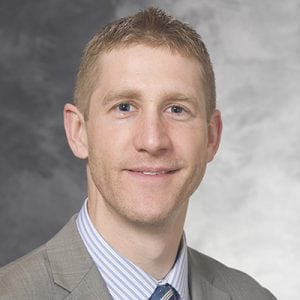
Sean Ronnekleiv-Kelly, associate professor in the Department of Surgical Oncology, is determined to improve treatment options for a rare but deadly form of liver cancer called fibrolamellar carcinoma (FLC), and he’s pursuing that goal with a new two-year, $276,000 grant from the Fibrolamellar Cancer Foundation.
FLC typically occurs in adolescents and young adults and tends to occur in people with healthy livers. It is often not diagnosed until it is at an advanced stage, making FLC much more difficult to treat and leading to poor patient outcomes: only 30-45% of people with FLC are alive 5 years after their diagnosis. Better treatment strategies are urgently needed, and in recent years the Ronnekleiv-Kelly lab has been studying FLC in animal models and in human tissue. This led to the discovery of a protein that was not working properly in patients with FLC.
“We found that this protein, CDK7, is unexpectedly activated in FLC cancer cells and that its presence alters gene expression in a way that can cause the cancer cells to proliferate faster,” Ronnekleiv-Kelly explained. “We also found that manipulating CDK7 to inhibit its function can actually cause FLC cancer cells to die. This tells us that inhibiting CDK7 could potentially be a good target for drug development.”
With his new grant from the Fibrolamellar Cancer Foundation, Ronnekleiv-Kelly will test this theory by transplanting human FLC tumor tissue into mice. This is the next step that will help researchers determine whether targeting CDK7 could be a way to treat FLC. This will allow them to study more closely how inhibiting CDK7 works and whether it has side effects. They will also be able to combine it with other promising drugs to see if the combination of drugs is more effective than one drug alone at killing FLC cancer cells.
“The peak age of diagnosis for FLC is 22 years, so this disease has a huge impact on years of life lost. If our research on CDK7 is successful, it could help advance treatment for this rare and fatal disease,” said Ronnekleiv-Kelly.
About the Fibrolamellar Cancer Foundation:
The primary purpose of the Fibrolamellar Cancer Foundation (FCF) is to encourage, advance and fund research that will significantly improve outcomes for patients with fibrolamellar carcinoma (FLC), a rare form of liver cancer that occurs primarily in adolescents and young adults who have no history of liver disease. FCF, a public nonprofit 501(c)(3) organization based in Greenwich, CT, was founded in 2009 by Tucker Davis, an FLC patient. Today, FCF is the leading nongovernmental funder of FLC research. By supporting cutting-edge research, actively recruiting researchers and collaborating to explore the origins of the disease, FCF hopes to develop more effective therapies and ultimately a cure for FLC. 100% of all donations go directly to FLC research.
